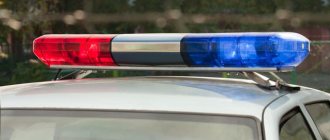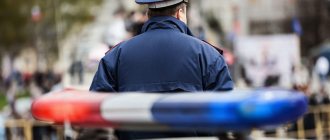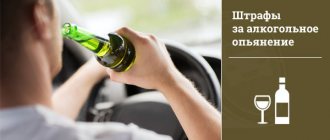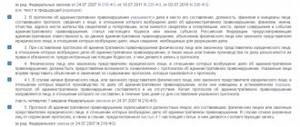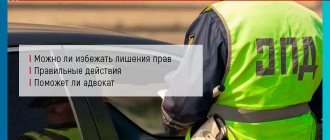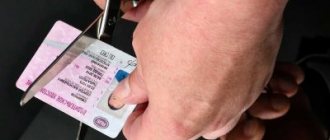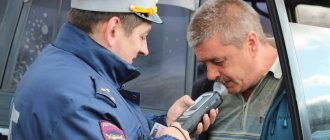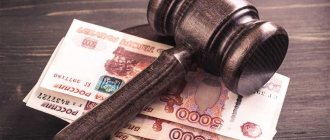- July 27, 2018
- Administrative law
- Marina Lobacheva
Any car owner must use his car only when sober. For drunkenness, serious penalties are applied to citizens, represented not only by a large fine, reaching 300 thousand rubles. for repeated violations, but even deprivation of rights and freedom for up to two years. Often, car owners are faced with the fact that traffic inspectors require a medical examination. Every person is aware of the state he is in, so if he is sure that he is sober, then it is advisable to undergo an independent medical examination for intoxication. This will allow you to challenge the results of the inspection conducted by the traffic inspector.
When is the inspection carried out?
An alcohol intoxication test is required when a traffic inspector notices that the driver shows signs of intoxication. They may be as follows:
- incoherent speech;
- drunken gait;
- unpleasant and characteristic odor.
The verification procedure consists of two stages. Initially, a breathalyzer is used on site, with the help of which it is determined how much alcohol is present in the vapor exhaled by the citizen. If the participants in the process do not agree with the results, then a medical examination is carried out to determine the state of intoxication. The process is performed in special inpatient medical institutions or special mobile units. To do this, blood and urine tests are taken, and the driver exhales into a breathalyzer twice.
Often, based on the results of a medical examination for intoxication, it is revealed that the citizen is indeed drunk. If even after this check the driver is confident that there is no alcohol in his blood, then it is advisable for him to contact special medical centers to conduct an independent study. If the conclusion of a medical examination for the state of intoxication, carried out again, differs from the initial report, then the decision can be challenged. Additionally, the traffic inspector and medical workers can be held accountable through the court.
Medical examination for intoxication
How and why a medical examination is carried out
Medical examination for intoxication is carried out 24 hours a day in medical examination rooms for intoxication.
The purpose of the medical examination is to establish the presence or absence of intoxication, facts of consumption of alcohol, narcotic drugs, psychotropic, new potentially dangerous psychoactive, intoxicating or other intoxicating substances.
Medical examination includes:
a) examination by a psychiatrist-narcologist;
b) examination of exhaled air for the presence of alcohol;
c) determination of the presence of psychoactive substances in urine;
d) study of the level of psychoactive substances in urine;
e) study of the level of psychoactive substances in the blood.
When examined by a psychiatrist-narcologist, exhaled air is examined for alcohol content at intervals of 15-20 minutes (if the first examination of exhaled air is negative, a repeated examination of exhaled air for the presence of alcohol is not carried out) using technical measuring instruments.
Medical examination of the person driving the vehicle
Complaints, medical history and examination are collected in order to identify clinical signs of intoxication.
Regardless of the results of tests of exhaled air for the presence of alcohol, biological objects (urine, blood) are selected for sending for chemical and toxicological testing.
Medical examination of other persons
●
person who committed an administrative offense
●
a person whose medical examination result is necessary for:
●
confirmation or refutation of the commission of a crime or administrative offense,
●
criminal investigations,
●
objective consideration of a case of an administrative offense
●
a soldier or citizen called up for military training
●
an employee who shows up at work showing signs of intoxication
●
an unemployed person who showed up for re-registration with signs of intoxication
●
independently applied adult citizen, a minor over fifteen years of age
●
a minor under the age of fifteen years
●
a minor in order to establish the state of drug or other toxic intoxication
●
a citizen recognized as incompetent in accordance with the procedure established by law, if such person, due to his condition, is not capable of giving consent to a medical examination being carried out in relation to him
If there are at least three clinical signs of intoxication and a negative result of the first or repeated test of exhaled air for the presence of alcohol, a sample of a biological object (urine, blood) is taken to be sent for a chemical-toxicological study in order to determine the drugs (substances) or their metabolites (with the exception of alcohol ), causing intoxication.
How are the examination results compiled?
The results of the examination are documented in the Certificate of Medical Examination for Intoxication (Alcohol, Drug or Toxic) (Form No. 307/u-05), certified by the signature of the doctor who conducted the examination and the round seal of the office in which the examination was carried out.
Medical examination of citizens sent for examination by their employer
Where to conclude an inspection agreement
An agreement for the provision of paid medical services with legal entities is concluded on the main territory of the State Budgetary Institution "MNPC Narcology Department of Health" (Lublinskaya St., 37/1) and signed by the director of the Center. Contact Larisa Yagudina.
What is the basis for examination
The basis for conducting an examination is a referral from the employer with the attachment of the employee’s informed voluntary consent to conduct the examination, consent to the processing of personal data and a statement of consent to transfer the conclusion on the results of the examination to the employer’s representative.
The referral must contain information about the person being sent for examination and the name of the employer’s representative authorized to receive the Certificate with the results of the employee’s examination.
How to get the results of the examination
Within 10 (ten) working days after the examination, the employer’s representative is given a completed Certificate, a certificate of the results of chemical and toxicological studies, and the results of an exhaled air test on paper; the person being examined - copies of the above materials.
Medical examination of citizens independently applying for medical services
Where to conclude an inspection agreement
An agreement for the provision of paid medical services with individuals is drawn up at the place of provision of services and signed by the head of the department of medical examination for intoxication.
What is the basis for examination
A medical examination is carried out on the basis of a written application from an individual for a medical examination with a detailed statement of the reasons for the examination and presentation of a document proving his identity with the attachment of informed voluntary consent to the examination, consent to the processing of personal data.
Timing of the examination
A medical examination is carried out immediately after the presentation of a written application from an individual for a medical examination.
Then the person being examined is given a receipt for payment of the cost of the examination by depositing funds into the bank account of the International Scientific and Practical Center for Narcology using the details specified in the receipt.
How to get the results of the examination
The results of the examination, including the results of the study of exhaled air, are communicated to the examinee only after payment of the cost of the examination.
Within 10 (ten) working days upon presentation of the paid receipt, the medical examination materials in one copy (a completed protocol, a certificate of the results of chemical and toxicological studies, two results of a study of exhaled air on paper) are transferred in the Office to the personally examined person.
The issuance of conclusions based on the results of examinations is carried out in the Medical Examination Offices from 09.00 to 16.00 on weekdays.
What is considered a positive alcohol test result?
A positive result of a study of exhaled air is the presence of absolute ethyl alcohol in a concentration exceeding the possible total measurement error, namely 0.16 milligrams per liter of exhaled air
When is urine tested and when is blood tested?
In the presence of an acute illness, a condition that poses a threat to the life of the person being examined, or if within 30 minutes the person being examined declares the impossibility of donating urine, blood is drawn from a superficial vein into two test tubes. In other cases, urine is collected and examined.
Rules for challenging a decision
Traffic inspectors do not have the right to independently deprive drivers of their licenses. Therefore, this procedure is performed exclusively by the court after considering all documents related to this case. To do this, the results of a medical examination for intoxication are taken into account. But even if the traffic inspector has this document, there are certain situations when the result can be challenged. In this case, no liability measures will be applied to the driver.
The dispute must be handled by the direct owner of the car. If he is sure that he was driving the car while sober, then it is advisable to take advantage of an independent medical examination for intoxication. In this case, it can be proven that the citizen was in fact sober.
Repeated medical examination
Even after undergoing a medical examination, the decision made may work against you, even if you are sure that you did not drink today, nor yesterday, nor a week ago. Accordingly, everything was “bought” a long time ago. But how to prove this to the court?
To begin with, you should not worry, but silently take a copy of the protocol on your case and prepare for the trial. After the inspector has released you, you must go to a paid clinic to undergo a second medical examination. At the moment, there are no regulatory documents that establish the timing of the examination. But the sooner you do it, the better.
If the result is positive, that is, you are not drunk, then this act must be preserved, as this will be strong evidence in court. To ensure that the decision at the hearing is in your favor, you must consult with a lawyer in advance. Since any trial requires good preparation. Next, you need to pick up your car from the special parking lot, since on the basis of Part 1 of Article 27.12 of the Code of Administrative Offenses of the Russian Federation you have been suspended from driving a vehicle.
Reasons for challenging the decision
To challenge a ruling that establishes that a driver was driving while drunk, various grounds may be used. The most commonly used reasons are:
- based on the results of an independent medical examination for alcohol intoxication, carried out within two hours after the initial examination, it is established that the citizen is sober;
- the inspection report was not drawn up correctly, since traffic police officers used a breathalyzer with violations;
- when drawing up the act, no witnesses were invited;
- when drawing up a medical examination report, the doctor made significant errors, on the basis of which this document is invalidated;
- while studying the document, it is revealed that there are corrections in it that are not certified by officials of the medical institution;
- the traffic inspector did not offer the driver to undergo a check at the stop;
- there are other significant doubts about the validity and relevance of the act, for example, the device used by the traffic inspector was not equipped with a seal;
- the traffic inspector had no legal grounds for using a medical check of the driver.
The most effective is the use of independent research. But this method is relevant if the driver is really sure that there is no alcohol in his blood.
The nuances of passing a re-inspection
If the driver does not agree with the results of the on-site examination and check at the medical institution where he was sent by the traffic inspector, then he can undergo an independent medical examination for intoxication. To do this, the following nuances must be taken into account:
- the process is carried out exclusively within two hours after the initial study, since otherwise the results will not be accepted by the court, since there is a possibility that alcohol will already be removed from the body;
- Only a medical institution that has a license for this activity is selected for the procedure, and it must also have the appropriate equipment to perform this task;
- You can contact not only government organizations, but also commercial companies;
- the results of a study conducted in a government institution are positively perceived by the court, since there are no doubts about the veracity of the test;
- the driver must receive a special report based on the results of the study;
- the check is paid, so you will have to pay a certain amount of money for the procedure.
Applying for a second medical examination for alcohol intoxication is only relevant if the citizen is truly confident that he is right. If the act states that there is alcohol in the blood, then it will not be possible to challenge the decision.
The legislative framework
The process of conducting a medical examination for alcohol intoxication is regulated by various legal acts:
- Order No. 933n dated December 18, 2015, issued by the Ministry of Health of the Russian Federation;
- Federal Law No. 3 of 01/08/1998 “on narcotic and psychotropic drugs”;
- Federal Law No. 2, 6;
- Federal Law No. 308 dated July 14, 2003 “about medical examination...”;
- Art. 27.1.1 Code of Administrative Offenses of Russia, etc.
Attention!
have undergone appropriate training at
a drug treatment During the training process, they were required to read a program developed by the Ministry of Health of the Russian Federation. All issues related to the rules for conducting alcohol testing are regulated by Appendix No. 7 to Order No. 308 of July 14, 2003
In accordance with the regulations of the Federal legislation (Article 27 of the Code of Administrative Offenses), traffic police inspectors must send all stopped motorists who express disagreement with an on-site examination for alcohol intoxication to a medical examination. Not long ago, changes were made to this regulatory act, due to which the inspection process itself changed. For example, before the law was amended, traffic police officers had to offer on the spot to a person suspected of violating the alcohol content in his body.
Thanks to legislative innovations that entered into legal force on March 26, 2016, motorists in any case must be sent to a hospital for a medical examination. In this case, the breathalyzer readings will not even be taken into account. In a specialized medical institution, biological materials will be collected from suspects: urine, blood.
Then they are transferred to the laboratory for microscopic, chemical and toxicological studies. Now even those who like to smoke weed will fall under the “hood of justice”, since the presence of components of marijuana or other light drugs in the body will be determined within a month.
Pre-trial procedure for challenging
After receiving the results of the study, it is not recommended to immediately sue the traffic police officer. Initially, it is advisable to use administrative challenge. It involves filing a complaint with the management of the traffic police department where the employee who drew up the report works.
The procedure must be completed within 10 days after the document is issued. The appeal is considered within ten days. If the organization refuses to change or destroy the protocol, then the problem will have to be resolved through the courts.
Judicial order
If a correctly completed medical examination report for intoxication indicates that the citizen was sober at the time of driving, then it will not be difficult to challenge the report. To do this, follow these steps:
- the statement of claim is drawn up correctly;
- you must go to court at the location of the traffic police unit where the traffic inspector who issued the report works;
- all the circumstances of the case are given in the claim;
- it is indicated that immediately after the check by the traffic police officer, he contacted an independent organization for a repeat test, the results of which did not reveal alcohol in the blood;
- The statement received from the doctors is attached to the claim.
If the court finds that the examination by the traffic inspector was actually carried out with many violations or using a device that was not equipped with the necessary elements, then this will lead not only to the cancellation of the decision, but also to holding the traffic police officer accountable.
Which doctors examine the driver?
The procedure for a medical examination for intoxication involves a thorough examination of the citizen’s condition. Several specialists are involved for this:
- a psychiatrist assessing the emotional state of the victim;
- a narcologist who examines the driver’s exhaled vapor, urine and blood;
- therapist writing the report.
Doctors check several factors at once. These include not only the presence of a certain amount of ppm in the blood, but even the general condition of the person. Urine and blood tests are taken, and the skin is also examined by doctors, as they must make sure that prohibited substances were not introduced directly into the citizen’s blood. Often special tests are used to determine whether the performance of a person’s speech apparatus corresponds to a certain norm.
Process Features
Every driver who wishes to take advantage of an independent study should know how a medical examination for intoxication is carried out. The rules of the process include:
- Initially, a general examination of the driver is carried out by a therapist and a narcologist;
- further, a breathalyzer is used to determine whether there is alcohol in the exhaled vapor;
- A urine and blood test is taken, which allows us to detect not only the presence of alcohol in the body, but also various other prohibited substances.
It is preliminarily established whether the driver took any medications before driving that could affect the results of the study.
If the first test does not show the presence of alcohol in the blood, then a second test is not done, which is indicated in the test report. Additionally, testing for clinical signs of intoxication is used. All data obtained must be indicated in the act of an independent medical examination for intoxication.
How does the assessment work?
If during the examination alcohol was detected in the driver’s body, the law provides for a fine for this. However, if the referral for examination was provoked by gross violations of traffic rules, then the driver’s responsibility no longer becomes administrative. In some cases, courts interpret such behavior as a deliberate crime directed against the health and life of people. If traffic police officers suspect that the stopped driver is drunk, he is sent for a mandatory examination, which will help identify the presence and degree of his intoxication.
Content:
- How does the assessment work?
- Sobriety monitoring devices
- The process of establishing the fact of intoxication
Such a procedure must be carried out. Specialists can organoleptically detect alcohol intoxication by the driver’s lack of coordination of movements, the smell of alcohol on the breath, redness of the skin, and tremors of the limbs. A person can also exhibit behavior that is characteristic exclusively of drunk people. To definitively identify the liquid that the driver drank, an independent examination of the biological fluids of the person being examined can be performed clinically. There should be no error in these studies, since they not only indicate intoxication as such, but are also designed to accurately determine the degree of intoxication. In order to increase the accuracy of research, clinics use many different measuring instruments.
Physical or chemical analysis methods are used to detect alcohol. Such methods will be able to reliably answer the question of whether there are alcohols in the driver’s blood; they will determine their chemical composition and exact quantity. Such tests are carried out in 2 stages - in the first, alcohol in the suspect’s blood is determined or identified, and in the second, its amount is measured. During such analyzes, the error with which specialists can determine the above indicators is also measured. The error is also taken into account when drawing up the final conclusion.
However, this technique has its drawback. In modern conditions, legislation does not clearly regulate how an error may be present in a conclusion. Instruments used for measurements usually have an error of up to 20%. At the same time, in conclusions taking into account such an error, you can often see data that the driver has from 2 to 3.3% alcohol in his blood. An alcohol level of up to 2.2% is acceptable, since at this level we can conclude that a person did not necessarily drink alcohol, he could only use some alcohol-containing drugs for health, but a standard of 3.3% is already unacceptable . In this context, the legislation is not yet perfect and requires careful refinement.
What does the act contain?
Many drivers, confident that they were driving sober, prefer to undergo an independent medical examination for intoxication. The procedure ends with doctors drawing up a special report. It contains the following information:
- it is established whether the citizen is really intoxicated;
- indicates whether the person refused to undergo certain tests.
If the document states that the driver is indeed sober, then you can apply this document to the traffic police or directly to the court to challenge the protocol. The procedure is considered quite complicated, but in this case, an appeal can be made against a medical examination for intoxication performed in the institution where the driver was taken by the traffic police officer. This can lead to negative consequences for the organization, since the court determines that doctors use false information.
Refusal to undergo a medical examination
In this part of our article, I really want to talk about responsibility, as well as what to do if you refuse a medical examination. Many of us believe that going through this procedure violates your rights. But this is by no means true, and this kind of verification is needed. Unfortunately, drivers do not always understand this and refuse the examination, which leads to large fines and deprivation of their driver’s license.
Failure by the driver of a vehicle to comply with the legal requirement of an authorized official to undergo a medical examination for intoxication shall entail the imposition of an administrative fine in the amount of thirty thousand rubles with deprivation of the right to drive vehicles for a period of one and a half to two years.
Part 1 of Article 12.26 of the Code of Administrative Offenses of the Russian Federation
As we can see, the article for refusing a medical certificate for alcohol does not predict a bright future for us. This all happens because, by refusing the verification procedure, you automatically admit that you are drunk, and being intoxicated while driving is punishable under Part 1 of Article 12.8 of the Code of Administrative Offenses of the Russian Federation.
Driving a vehicle by a driver who is intoxicated shall entail the imposition of an administrative fine in the amount of thirty thousand rubles with deprivation of the right to drive vehicles for a period of one and a half to two years.
Part 1 of Article 12.8 of the Code of Administrative Offenses of the Russian Federation
If you have previously been deprived of your license or do not have a driver’s license at all, then refusing to take the examination will cost you even more.
Driving a vehicle by a driver who is intoxicated and does not have the right to drive vehicles or is deprived of the right to drive vehicles - entails administrative arrest for a period of ten to fifteen days or the imposition of an administrative fine on persons in respect of whom, in accordance with this Code, An administrative arrest in the amount of thirty thousand rubles may be applied.
Part 3 of Article 12.8 of the Code of Administrative Offenses of the Russian Federation
Failure by a driver of a vehicle who does not have the right to drive vehicles or has been deprived of the right to drive vehicles to comply with the legal requirement of an authorized official to undergo a medical examination for intoxication - entails administrative arrest for a period of ten to fifteen days or the imposition of an administrative fine on the persons concerned. of whom, in accordance with this Code, administrative arrest in the amount of thirty thousand rubles cannot be applied.
Part 2 of Article 12.26 of the Code of Administrative Offenses of the Russian Federation
There is currently no penalty for repeatedly refusing a medical examination, but it is planned to introduce sanctions in relation to this violation. In the meantime, for every refusal to conduct an examination, you face punishment under Part 1 of Article 12.8 of the Code of Administrative Offenses of the Russian Federation, unless, of course, you are deprived of your rights.
Your vehicle will be sent to a special parking lot.
The main thing to remember is that if you refuse a traffic police examination, you will be sent for a medical examination. And if you don’t want to do this, then remember the punishment that awaits you.
How to protect yourself from deception and collusion?
There are often cases when drivers are faced with the fact that doctors and traffic inspectors are in cahoots, therefore, based on the results of examinations, it is established that the citizen is intoxicated. If a person is confident that he is completely sober, then he is not allowed to agree with the research results, so it is advisable to challenge them with the help of an independent examination.
To protect yourself from deception and possible collusion, it is recommended to consider the following facts:
- it is not allowed to refuse the examination, as this is regarded by the traffic inspector as driving while intoxicated;
- You must communicate with police officers politely and calmly;
- if a video recorder is installed on the car, then it must be turned on, since due to the presence of a recording device it can be proven that the traffic police officer extorted money or violated the law by other actions;
- Before using a breathalyzer, it is advisable to request documents for this device from the traffic inspector to ensure that it is up to date and operational;
- it is not allowed to enter any information into the protocol under the dictation of a traffic police inspector, therefore all data is entered independently based on the facts identified;
- if the traffic inspector does not invite witnesses to the examination, then the motorist can demand their presence, otherwise he can refuse to use the breathalyzer;
- it is not allowed to sign various documents issued by a traffic police officer, so you should insist on drawing up a protocol;
- It is not allowed to agree to collusion or scams.
Raids, on the basis of which traffic police officers identify drunk drivers, are common and frequent. Often, traffic inspectors insist that a particular car owner is drunk, even in the absence of signs of intoxication. In this case, every citizen should know how to protect themselves from slander. If, even after passing a medical test, it is determined that he is drunk, then it is advisable to use an independent study. The procedure for medical examination to determine whether a driver is intoxicated is considered simple and clear. If, after a repeated check, it is revealed that the citizen is completely sober, then it is easy to challenge the results of the previous assessment.
Frequent errors during the process
Despite the fact that Federal legislation clearly defines the procedure for conducting a medical examination, its procedure is often accompanied by various violations:
1. Traffic police inspectors used a breathalyzer at the scene of the driver’s examination, but did not take into account the permissible error when determining the indicators.
This procedure must be carried out in accordance with the instructions. To correctly measure the level of alcohol in the exhaled air, the suspected offender should be allowed to blow into the tube twice, while observing a 20-minute break between manipulations. The result can be considered positive if the device indicates the presence of alcohol both times. But when the breathalyzer showed an excess of the norm within the margin of error, such a result cannot be counted as positive.
2. When drawing up the protocol, traffic police inspectors did not indicate signs in the driver’s behavior characteristic of alcohol intoxication.
Expert opinion
Artemyev Dmitry
Experience as a forensic expert in the field of automotive technical examination for more than 2 years, more than 3 years of work in the field of insurance disputes, appealing guilt in road accidents.
Ask a Question
As a rule, such a mistake is made when examining an individual who has taken narcotic or psychotropic drugs. In such a situation, biological material is collected from the suspect, which is subjected to chemical and toxicological studies in a laboratory. The result of the analysis will be ready in a few days, and based on it, the doctor can indicate in his conclusion the symptoms characteristic of the particular narcotic substance identified.
3. A highly specialized specialist who conducted a medical examination of the driver may make a mistake when indicating the substance/substance that caused intoxication.
4. They refuse to hand over a medical certificate or report to a person suspected of a violation.
For example, when a document is required to be drawn up by hospital inspectors in 3 copies. They are required to hand over one document to the owner of the car who underwent the examination. If such a violation is recorded, the results of the examination will be canceled because of it.
The nuances of challenging
If a citizen decides to challenge the results of a past examination in a medical institution, then they must take into account the following nuances:
- a repeat test must be performed within two hours after the last test, this ensures that alcohol could not in any way be eliminated from the human body;
- doctors are required to provide documents confirming the citizen’s identity, since information from these documents is included in the examination report;
- in the selected institution, an application for passing a test is drawn up on the basis that the person does not agree with the results of a previous test for intoxication;
- during repeated studies, material is taken in two copies for assessment, since one copy must be kept until the trial, since the judge may require additional verification;
- in order for the results to be reliable and relevant, it is recommended to donate urine, blood and saliva, which will provide the citizen with more arguments in his favor in court;
- If a person cannot undergo an independent study within the established time frame, then urine can be donated within 12 hours after drawing up the protocol.
If a traffic inspector takes away a driver’s license, but the citizen is sure that he is sober, then he must use all possible means to defend his position. By taking tests yourself at a government medical institution, you can confirm that you are right. Under such conditions, the charges are dropped through the court, and traffic inspectors are often brought to criminal liability for colluding with medical companies that draw up false reports.

